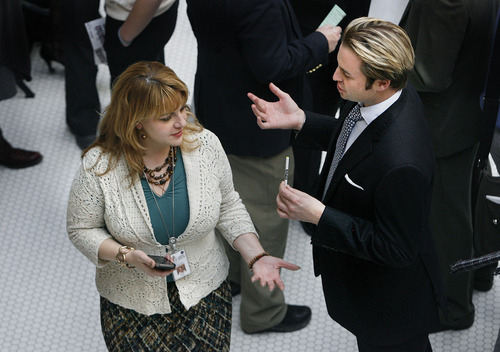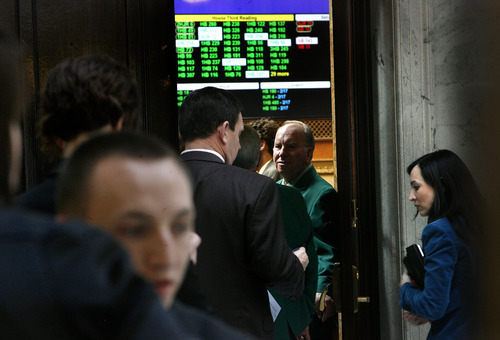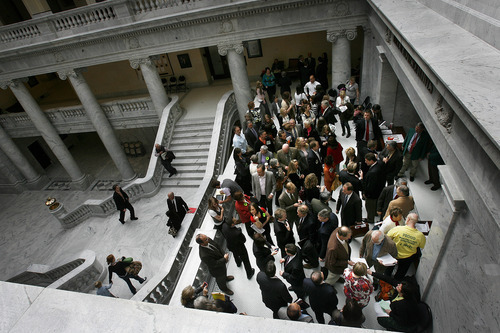This is an archived article that was published on sltrib.com in 2012, and information in the article may be outdated. It is provided only for personal research purposes and may not be reprinted.
As lines of lawmakers pour free sodas just before the Utah House convenes, Rep. Kraig Powell — a critic of such freebies — points at signs on drink machines in the House kitchen that say: "Compliments of the Utah Beverage Association."
It may just be a coincidence, but a proposal this year to impose an extra tax on soda — opposed by beverage companies — went nowhere.
Powell, R-Heber City, says he doubts anyone actually votes based on freebies they receive, but says food and events provided by special interests "do provide a measure of access, exposure and discussion that are not there otherwise" for poorer groups that cannot afford to provide perks.
"I hate that we have fallen into an arrangement where groups figure they have to participate by providing us food and entertainment … and we as a body even schedule slots for them to fill," Powell says.
Most of the events and perks that special interests provide during the legislative session are no longer reported to the public because of loopholes in new ethics laws — although The Salt Lake Tribune has developed a partial list by examining legislative social calendars that it obtained.
It found that at least 87 special interest groups are scheduled this year to offer 99 events — breakfasts, lunches, dinners, snack breaks, receptions, concerts and shows — in which one entire chamber, or both, were invited during the 45-day-long 2012 general session.
In fact, calendars show state senators have free lunches offered to them on 31 of the 33 actual work days of the session. (House members have fewer free lunches, because they pay for their own twice-a-week political party caucus lunches.) Of note, the state pays legislators $61 a day this year in per diem for meals and incidental expenses, much of which they can pocket if they take advantage of free meals.
Until two years ago, special interests were required to report most such spending in disclosure forms. That ended with a new ethics law that in theory requires lobbyists to disclose the name of any legislator on whom they spend more than $10 a day — but it has a big loophole.
It allows special interests to spend more than $10 on food and beverages for lawmakers any time that all members of the House, Senate, a party caucus or a committee are invited to an event. It also does not require reporting of such events, how much is spent, or who attended.
As an example of events by groups seeking to influence legislators, the Hale Centre Theatre in West Valley City held a Feb. 23 dinner for lawmakers followed by its U.S. premiere of "Zorro, the Musical." (Lawmakers had to pay the price of play tickets above $10 to comply with ethics laws.) That theater is seeking $5 million from the Legislature.
The new Leonardo museum in Salt Lake City hosted a "Legislative Family Night" on Jan. 24. It is seeking $500,000 from the Legislature.
The Utah Shakespeare Festival hosted a luncheon for Senate party caucuses on Feb. 23. It is seeking $5 million from the Legislature.
While the Legislature is dealing with 119 education bills this session, the state PTA held a lunch on Feb. 24; the American Association of Educators hosted a dinner at the Sheraton on Jan. 27; Parents for Choice in Education scheduled two lunches for senators; and the Utah Education Association hosted two snack breaks.
As the Legislature faced at least 32 health care bills, separate meals were hosted by the Utah Association of Health Underwriters, Merit Medical, the Utah Hospital Association and the Health Forum of Utah; snack breaks were sponsored by Utah Health Plans, Molina Healthcare and the Utah Public Health Association; and receptions were held by the Utah Pharmacists Association and Johnson & Johnson.
Others scheduling free events included lobbying firms that represent multiple clients, and such companies and groups as EnergySolutions, Ballet West, Questar, McDonald's (including an appearance by Ronald McDonald), the Intermountain Power Agency and Zions Bank.
A complete list of all groups and events they sponsored, according to social calendars or announcements made in each chamber, is available online at sltrib.com.
Ken Bullock, executive director of the Utah League of Cities and Towns, explained why his group sponsored a lunch for lawmakers.
"It gives us an opportunity to interact with many legislators at the same time," he said. Elected officials from cities and towns around the state also attended the lunch. "They represent the same constituents as legislators. It gives them a chance to talk about our issues."
But Linda Hilton, director of the Coalition of Religious Communities, a group that advocates for the poor, which Hilton said cannot afford to host events for legislators, says the current system gives a big advantage to wealthier groups and interests.
"We stand in the hall and send notes in to legislators, hoping they will come out and talk to us for two minutes. And many of them won't," she says. "But when you are giving a dinner in a room, legislators can't avoid talking to the group buying it. It helps them immensely and improves their access."
Senate President Michael Waddoups, R-Taylorsville, agrees to a point. "As I go to those dinners, I know that invariably they take time to discuss their issue. … It facilitates it so they don't have to do it one-on-one. They can get 20, 30 or 40 [lawmakers] at a time."
But he says legislators are fairly accessible to anyone who wants to talk to them, and no freebies are needed to talk. So he also does not see the free food as buying votes, but "it certainly provides information."
House Minority Leader David Litvack, D-Salt Lake City, also sees no problem with the lobbyist-sponsored events.
"I might have more of a problem with it except the groups that do [provide meals] are so diverse. About every kind of group you can imagine does it. It doesn't exclude anyone," said Litvack.
But Rep. Jim Nielson, R-Bountiful, worries about the public perception created. He insists on paying for food provided by outside groups if he attends their events. "I want to avoid even the appearance of undue influence," he said — but adds that he doubts other lawmakers are actually swayed by the free food.
Powell, who goes a step further by refusing even campaign donations from special interests for the same reason, also says it is sometimes hard to get groups to accept payment for their food or events. "I sometimes take my kids to legislative nights at museums. I try to find someone to pay, and you sometimes can't find anyone who will take it."
He said even on some days when he is eating a caucus lunch that he thinks he has paid for, "I'm told, 'No, you need to go down to where the PTA is serving lunch and get food there.' … That could be why most will say that the free food has no influence on them, since sometimes we don't know who bought it."
But he is one who would like to see the system change. "Too many figure they have to participate by buying us dinner. That's not right."







